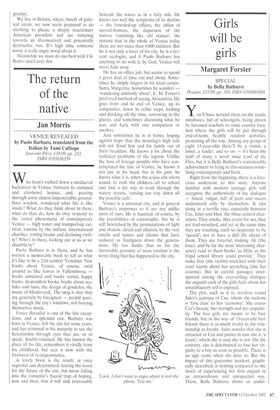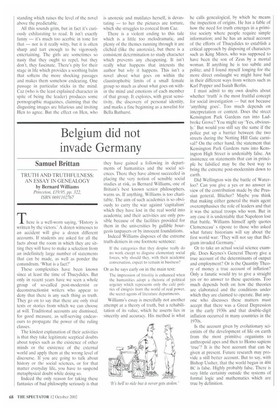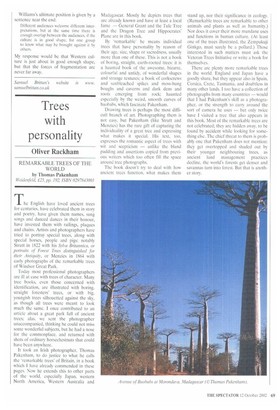Girls will be girls
Margaret Forster
SPECIAL by Bella Bathurst
Picador, £15.99, pp. 310, ISBN 0330491008
You'll have noticed them on the roads, minibuses, full of schoolgirls, being driven by harassed teachers to some country location where the girls will be put through end-of-term, healthy outdoor activities, protesting all the way. Among any group of eight 13-year-olds there'll be a victim, a loner, a leader, and so on — it's been the stuff of many a novel since Lord of the Flies, but it is Bella Bathurst's considerable achievement to bring to this scenario something contemporary and fresh.
Right from the beginning, there is a ferocious undertone to this story. Anyone familiar with modern teenage girls will recognise the authenticity of the dialogue — brutal, vulgar, full of jeers and sneers understood only by themselves. It zips along at a terrific rate, especially between Caz, Jules and Hen, the three central characters. They smoke, they yearn for sex, they are foul-mouthed, and yet at the same time they are touching, each so desperate to be 'special', not to have a dull life ahead of them. They are forceful, making Ali (the loner, and by far the most interesting character) read to them books 'as filthy as the frigid school library could provide'. They make Izz-y (the victim) wretched with their cruel taunts about her scratching (she has eczema). But in careful passages interspersed among the ever-rolling dialogue the anguish each of the girls feels about her unsatisfactory self is exposed.
The plot, such as it is, revolves round Jules's jealousy of Caz, whom she reckons is 'first class' to her 'economy'. She craves Caz's beauty, her strength and her popularity. The two girls are meant to be best friends, but in the way of 13-year-old best friends there is as much rivalry in the relationship as loyalty. Jules worries that she is attracted to Caz and panics in case she is 'a lezzie', which she is sure she is not. On the contrary, she is determined to lose her virginity to a boy as soon as possible. There is an ugly scene when she does so. But the impact of this gruesome incident, graphically described, is nothing compared to the shock of experiencing her first orgasm in an extraordinary and unexpected way, There, Bella Bathurst shows an under standing which raises the level of the novel above the predictable.
All this sounds grim, but in fact it's curiously exhilarating to read. It isn't exactly funny — it's much too acerbic in tone for that — nor is it really witty, but it is often sharp and tart enough to be vigorously entertaining. The girls are sometimes so nasty that they ought to repel, but they don't, they fascinate. There's pity for their stage in life which provides a soothing balm that softens the more shocking passages and makes them somehow endearing. One passage in particular sticks in the mind. Caz (who is the least explained character in spite of being the leader) produces some pornographic magazines, claiming that the disgusting images are hilarious and inviting Hen to agree. But the effect on Hen, who is anorexic and mutilates herself, is devastating — to her the pictures are torture, which she struggles to conceal from Caz.
There is a violent ending to this tale which is a little too melodramatic, and plenty of the themes running through it are cliched (like the anorexia), but there is a consistent determination to study character which prevents any cheapening. It isn't really what happens that interests the author but why it happens. This isn't a novel about what goes on within the claustrophobic limits of a small female group so much as about what goes on within the mind and emotions of each member of that group. It explores, with great sensitivity, the discovery of personal identity, and marks a fine beginning as a novelist for Bella Bathurst. he calls genealogical, by which he means the inspection of origins. He has a fable of how the need for truth emerges in a primitive society where people require simple information; and he has an actual account of the efforts of Thucydides to establish a critical approach by disposing of characters such as King Minos, who was supposed to have been the son of Zeus by a mortal woman. If anything he is too subtle and polite; and I found myself longing for the more direct onslaught we might have had in their different ways from writers such as Karl Popper and Isaiah Berlin.
I must admit to my own doubts about whether 'truth' is the most fruitful concept for social investigation — but not because 'anything goes'. Too much depends on interpretation or context. Does the street Kensington Park Gardens run into Ladbroke Grove? You might say 'Yes, obviously.' But would you still say the same if the police put up a barrier between the two streets during the Notting Hill Gate carnival? On the other hand, the statement that Kensington Park Gardens runs into Kensington High Street is undeniably false. An insistence on statements that can in principle be falsified may be the best way to bring the extreme post-modernists down to earth.
Did Wellington win the battle of Waterloo? Can you give a yes or no answer in view of the contribution made by the Prussian general, Bliicher? Maybe you think that making either general the main agent overemphasises the role of leaders and that it was the actual troops who won. But in any case it is undeniable that Napoleon lost that battle. Williams himself aptly quotes Clemenceau' s riposte to those who asked what future historians will say about the first world war: 'They will not say that Belgium invaded Germany.'
Or to take an actual social science example. Does Keynes's General Theory give a true account of the determinants of output and employment? Or is the Quantity Theory of money a true account of inflation? Only a fanatic would try to give a straight yes or no answer to these questions. Too much depends both on how the theories are elaborated and the conditions under which they are claimed to operate. But anyone who discusses these matters must accept that there was a Great Depression in the early 1930s and that double-digit inflation occurred in many countries in the 1970s.
Is the account given by evolutionary scientists of the development of life on earth from the most primitive organisms to anthropoid apes and then to Homo sapiens 'true'? It is the best account that can be given at present. Future research may provide a still better account. But to say, with Bishop Ussher, that the world began in 404 BC is false. Highly probably false. There is very Little certainty outside the systems of formal logic and mathematics which are true by definition.
Williams's ultimate position is given by a sentence near the end:
Different audiences welcome different interpretations, but at the same time there is enough overlap between the audiences, if the culture is in good shape, for one group to know what may be brought against it by others.
My response would be that Western culture is just about in good enough shape, but that the forces of fragmentation are never far away.
Samuel Brittan's website is www. samuelbrinan.co.uk




































































































 Previous page
Previous page